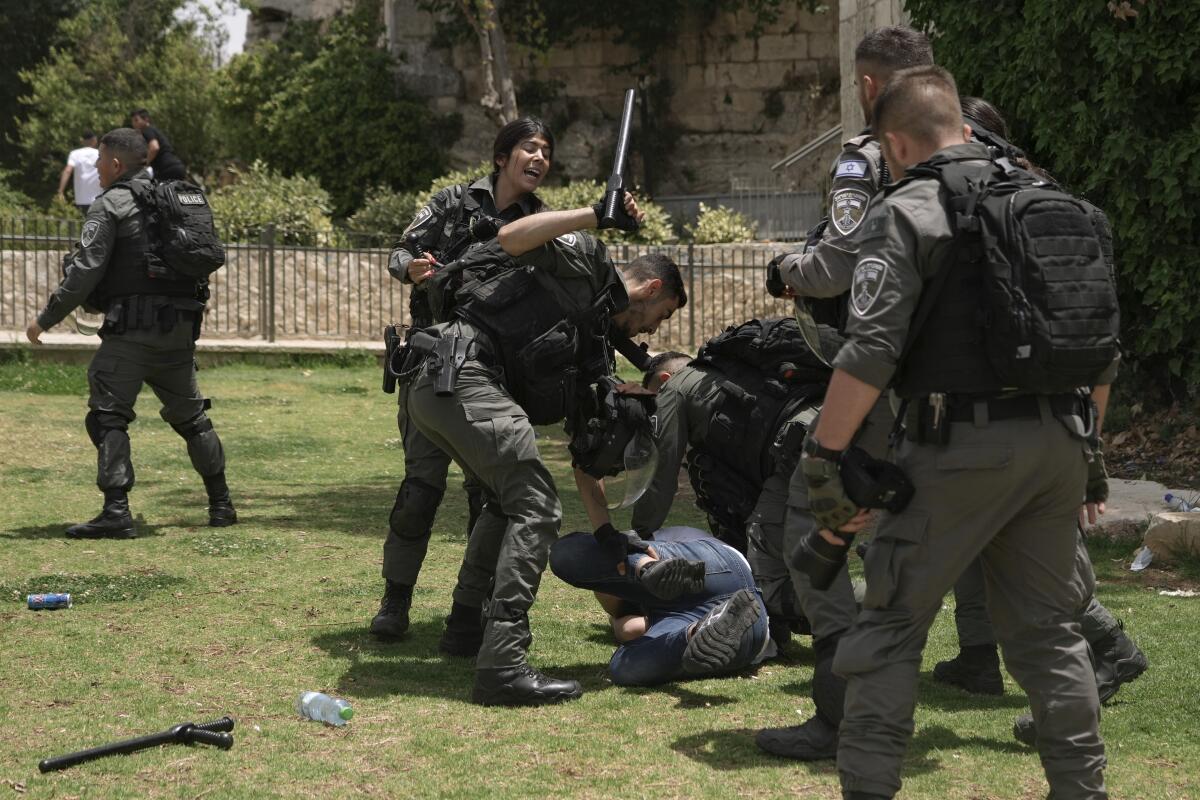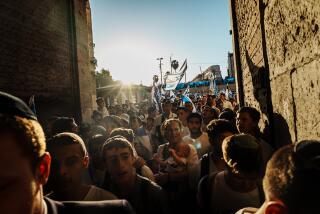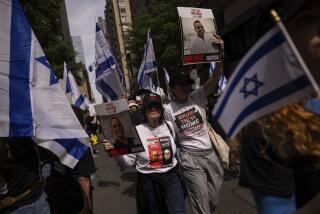Israeli prime minister defends march marked by violence, racism

- Share via
JERUSALEM — Israeli Prime Minister Naftali Bennett on Monday defended the decision to hold an annual march that celebrates Israel’s takeover of east Jerusalem and was marked by violence and anti-Palestinian racism.
Authorities called up thousands of police, forcibly cleared out Palestinians and risked another war with the Islamic militant group Hamas to ensure that tens of thousands of mostly right-wing Israelis could parade through a dense Palestinian neighborhood and hundreds could visit a bitterly contested holy site.
Israel had changed the route at the last minute during last year’s march, at a time of soaring tensions over violence at the holy site and attempts by settlers to remove dozens of Palestinian families from their homes in east Jerusalem.
Hamas still fired rockets, and an 11-day Gaza war ensued.
Israel avoided that scenario this year and allowed the parade to take its traditional route through the heart of the Muslim Quarter of the Old City.
But the march saw Israeli nationalists chant racist slogans, including “Death to Arabs,” and attack Palestinians and journalists. Fights broke out along the route, as police mainly intervened to protect Jews and forcibly disperse Palestinians.
The Palestinian Red Crescent rescue service said 62 Palestinians were wounded, including 23 who needed hospitalization. Israeli police said they arrested more than 60 suspects and that five officers were wounded. The vast majority of those arrested appear to have been Palestinians, though police refused to provide a breakdown.
Bennett praised the police’s handling of the event and said Israel was obliged to hold the march in the face of threats by Hamas.
“If we hadn’t done it along the regular route, we would — in effect — never go back to it,” he said. “This could have been a retreat on sovereignty.”
Bennett praised the marchers, saying that “except for an extremist group, whom we will deal with to the fullest extent of the law, those who celebrated yesterday did so in a very special, heart-lifting way.”
Defense Minister Benny Gantz said Israel would consider designating two far-right groups, La Familia and Lehava, as terrorist organizations. The former is the notoriously racist fan club associated with one of Israel’s most popular soccer teams, while the latter is linked to the late Rabbi Meir Kahane, who preached a violent, anti-Arab ideology.
But right-wing views are far more widespread in Israeli society. A strong majority of seats in Israel’s Knesset, or parliament, are held by right-wing parties that support Jewish settlement in the occupied territories and are opposed to Palestinian statehood, including one led by a disciple of Kahane.
Right-wing factions are split over whether former Prime Minister Benjamin Netanyahu should return to office, and some, including Bennett’s Yamina, partnered with centrist and left-wing parties last year to form a governing coalition and avoid more elections.
But the nationalist parties in the coalition have gotten their way when it comes to settlement expansion, acceptance of settler outposts and barring Israelis from extending citizenship or even residency to Palestinian spouses.
Bennett himself is opposed to Palestinian statehood, but his government has approved some steps to improve economic conditions for Palestinians.
Israel captured east Jerusalem, including the Old City with its holy sites sacred to Jews, Christians and Muslims, in the 1967 war, and annexed it in a move not recognized internationally. The Palestinians want east Jerusalem to be the capital of their future state.
Also Sunday, Israel allowed hundreds of mostly nationalist and religious Jews to visit the holy site that Jews refer to as the Temple Mount and Muslims know as the Al Aqsa Mosque compound. The site, which is the holiest for Jews and the third holiest in Islam, has frequently been the epicenter of Israeli-Palestinian violence.
The Palestinians fear Israel plans to take over the site or partition it. Israel says it is committed to a decades-old set of arrangements known as the status quo, under which Jews can visit the site but not pray there — but that rule has steadily eroded in recent years. Some of Sunday’s visitors were seen praying with little interference from police.
“Despite great efforts by far-right activists, Sunday’s Flag March in the Old City of Jerusalem didn’t lead to a major conflagration between Israel and the Palestinians,” Amos Harel wrote in a column in Israel’s Haaretz newspaper. “Instead, we witnessed the usual collection of racist displays, violent scuffles between Jews and Arabs and a general sense of revulsion.”
More to Read
Sign up for Essential California
The most important California stories and recommendations in your inbox every morning.
You may occasionally receive promotional content from the Los Angeles Times.










